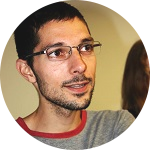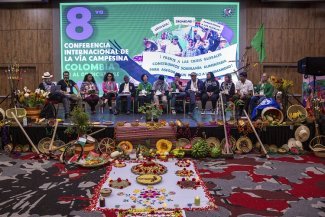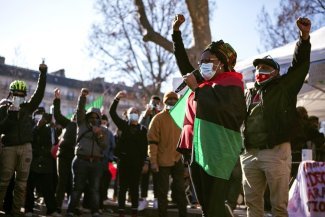Ali and Samer Kanjo in their home in Hay el-Gharbi, with their identity papers, marked ‘under review’, at their feet.
Juliano did everything he could to lead a normal life. He rented a flat with his mother Julie in the gentrified Mar Mikhael district of east Beirut. A young man with good looks and an angelic smile, he has worked multiple odd jobs that don’t require an identity card: labourer, dishwasher, waiter. Julie regularly attended church to pray for her husband who died shortly after the birth of her son, and for help in her fight against diabetes. Her prayers weren’t enough.
“My mother’s health has deteriorated. She lost a leg. I was no longer able to afford the cost of her treatment and our prohibitively expensive rent. That’s why we moved here a few months ago,” says the 24-year-old, standing in the basement of a former hospital squatted by Palestinian and Syrian refugees and migrant workers. For Juliano, the drop in circumstances has been demoralising. “I’ve never been interested in drugs, but sometimes I think about taking my own life.”
Juliano was born with a major handicap: being stateless in his own country. This is due to the fact that his father, although Lebanese, did not register his son’s birth before dying in an accident. According to the law, his mother, even though she is a Lebanese citizen, cannot register her own child with the civil registry. So Juliano has spent his entire life under the radar, without access to education, social benefits or the right to work – a legal handicap that members of the campaign My Nationality is a Right for Me and My Family have been fighting since 2001.
As Karima Chebbo, who heads the campaign for the regional collective CRTDA, explains, “According to Lebanese law, nationality can only be transmitted by the father. If a father fails to register his child within a year, it’s the beginning of an uphill battle for the mother and her children.”
In hopes of addressing this gender inequality, the CRTDA is calling for a reform of the nationality law, which was adopted in 1925 during the time of the French Mandate. Their efforts thus far have met with no success. “Ever since we began our campaign, politicians have used the same argument: granting this right to women could lead to the naturalisation of Palestinian refugees in Lebanon and destabilise the country’s confessional balance. But in 1994, [former] President Elias Hraoui issued a naturalisation decree allowing a majority of Muslims to be naturalised. [Current] president Michel Aoun has just naturalised 300 people, without any criteria or transparency,” she says indignantly.
According to Lina Abou-Habib, director of the collective’s office in Lebanon: “Hiding behind the argument for confessional balance is the idea that women must follow men, that they are second-class citizens.”
In response, CRTDA agreed to compile statistics on Lebanese women married to non-Lebanese men. The results showed that Lebanese women were much more likely to marry Lebanese men who are stateless or whose nationality is ‘under review’ than they were to marry Palestinian refugees.
In the shadow of the Republic
‘Under review’ has been written on the Kanjo family’s identity card for generations. “I was born in Lebanon, my father and my grandfather too, but our nationality is still ‘under review.’ Today I have two daughters who, like me, will not be able to go to school,” says a frustrated Samer Kanjo, 27, standing between the crumbling walls of his family’s single-room house in Hay el-Gharbi, an informal neighbourhood in the shadow of Beirut Municipal Stadium.
Because they lack Lebanese papers, Samer and his brother Hassib rarely leave the narrow, unpaved alleyways, ramshackle dwellings and tangled electrical wires of Hay el-Gharbi.
Samer, Hassib and Juliano have different types of stateless status. According to Samira Trad, head of the legal support programme for stateless persons for the NGO Frontiers Ruwad: “There are different types of stateless persons in Lebanon. One type consists of the children of parents who either failed to register their children despite having legal status themselves, or parents who themselves were not registered in the only population census to take place in Lebanon, in 1932, even if they were living in Lebanon at the time. The other type is called ‘under review’ and is composed of persons who were registered in the 1932 census but whose nationalities were unknown.”
Stateless persons who are ‘under review’ have a precarious status: the General Security Directorate issues them a pass that serves as an identity card. There are between 18,000 and 24,000 people ‘under review’. The rest, which Frontiers Ruwad estimates at 40,000, “are invisible,” explains Samira. “Their only possible means of obtaining nationality is through the courts.”
According to Marie-Rose Zalzal, a lawyer specialising in nationality, stateless persons live in the shadow of the Republic, whether they are ‘under review’ or not. “Citizens without nationality live in fear of the authorities and are denied the fundamental rights to education and healthcare. It’s important to remember that an identity card is also a means of social existence and self worth.”
According to Samer Kanjo, many of the residents of the slums of Hay el-Gharbi are ‘under review’. “We’re stuck here. We can’t afford to live anywhere else because we can only work under the table.” Like their father Ali, Samer and Hassib make a living playing in zaffés, wedding bands. Their clients are inhabitants of Hay el-Gharbi or their family and friends. With few other options, they are forced to rely on word of mouth to continue to make money. “Whenever we’ve looked for any other kind of work we’ve been asked for our papers, and since our status is ‘under review’, we’ve been refused,” says Samer. In a country where, according to the ILO, trade unions are weak and politicised, and where only 11 per cent of the population is unionised, stateless persons are also excluded from the fight for social justice. For Chebbo, “the problem of poverty results from lack of nationality and not the other way around.”
“Things move slowly…if they move at all”
Sitting in her apartment in Naameh, in the south of Beirut, Hannah Naif el-Hussein rattles off a list of her previous misfortunes, including repeated refusals of engagement by men and having to drop out of school because she wasn’t able to work. “When I was a teenager I was ashamed of myself, I wanted to set myself on fire and film it so my brothers and sisters wouldn’t suffer the same fate,” says the 28-year-old, who is now married. Her father, out of neglect and poverty, failed to register the birth of his six children.
A sympathetic neighbour recommended a television show to her that in turn connected her with Frontiers Ruwad. “They helped me to file a request for nationalisation with the court of Zahlé and paid for my DNA tests. This was over a year ago. My file has since been blocked by the Ministry of the Interior.” But Hannah can’t wait. She suffers from a lung disease and without social assistance she will soon no longer be able to pay for her treatment.
According to Trad: “Since 2006, we have provided legal support to 74 people in proceedings related to nationalisation.” This process can take between two and five years, so Frontiers Ruwad’s main focus is prevention.
“In 2015, we created a working group together with five ministries and the UN High Commissioner for Refugees aimed at reducing and preventing the number of stateless persons in the future. Thus far we’ve obtained a directive from the Ministry of Education to enrol stateless children in school. The Ministry of Social Affairs is considering extending its services to stateless persons. But beyond these gestures, what we are aiming for is a legal framework,” she says, showing no optimism. “There have been small improvements. Considering the political instability, the absence of a president, parliament or government most of the time, things move slowly. If they move at all.”










